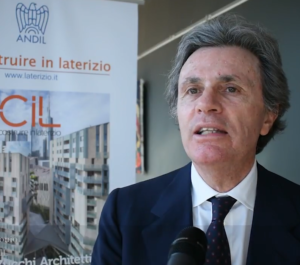Interview with Luigi Di Carlantonio, President of Andil

We report the interview with Luigi Di Carlantonio, released in June in his role as President of ANDIL. The association was incorporated by the Confindustria Ceramica Association at the end of July.
ANDIL and Confindustria Ceramica have always been at the forefront of the sustainability sector. Do you think that the “merger” of the two Associations can bring a further stimulus to sustainable development? What are the short and long term goals that you set yourself in this area?
Both associations have strongly focused on sustainability as a distinctive element of a production that is attentive to environmental issues and both have identified the EPD as the most complete and appropriate tool to represent the impacts associated not only with production, but with the entire life cycle.
All this in the knowledge that the high durability of ceramic products and their positive function during the use phase, in the containment of energy consumption and in the absence of releases of harmful substances, make ceramic materials preferable also in the aspect of environmental sustainability, as well as functionality and aesthetics.
The objective is to increase environmental communication and the value of sustainability. The sectoral average EPD, which covers the production of porcelain stoneware by Italian companies belonging to Confindustria Ceramica, is a useful tool and the LCA tool, developed to facilitate the elaboration of the LCA study of tiles, which is the basis of the EPD, it is of absolute value to communicate the sustainability of the various productions.
Industrie Cotto Possagno, Terreal Italia and Gruppo Stabila / Dosson are the first three companies in Italy to have published their EPD within the EPDItaly Program (for tiles and brick blocks). Do you think that, thanks to the enhancement of Italian excellence, the brick sector can “land” in Europe?
After the first attempts of a decade ago, we can finally welcome the fact that the brick industry also has its EPDs, thanks also to the opportunity offered by the Life Herotile project, which included the EPD for innovative tiles, developed in Italy within the project (www.lifeherotile.eu). And it is only the beginning, because we know that other important production companies are about to complete the path of the Environmental Declaration.
As for the effect on the market, there is no doubt that the EPD is a nice business card also for foreign countries.
How do you consider the initiative of EPDItaly, Italian Program Operator?
I would say: fundamental! We were cut off from the European EcoPlatform circuit and with EPDItaly we filled this void, which would have penalized Italian companies.
Furthermore, the constant search for agreements with the main international Program Operators, for the mutual recognition of the EPD also in other countries, without further verification, increases the value of the certification, especially for Italian ceramic tiles, which have a very high propensity to export.

